OK, sure, my big sister didn’t have superpowers, and as far as I know she did not save the world even one time, much less “a lot.” But from my perspective as her bratty little sister, I felt like I could never escape her long and intimidating shadow. I could never be as smart as her, as special as her; I couldn’t hope to collect even a fraction the awards and accolades she racked up through high school. And she didn’t even properly counteract her super smarts with social awkwardness: she always had a tight group of friends and the romantic affections of cute boys. She was the pride and joy of my family, and I always felt like an also-ran. Trust me: this makes it very hard to not be at least a little bratty and whiny.
 |
| Michelle Trachtenberg as Dawn Summers |
In the final scene of the first episode of
Buffy the Vampire Slayer‘s Season 5, Dawn Summers, Buffy’s never before seen or heard-of little sister, appears seemingly out of nowhere. While she’s completely new to the audience, oddly, it is clear that from the characters’ perspectives that Dawn has been there all along.
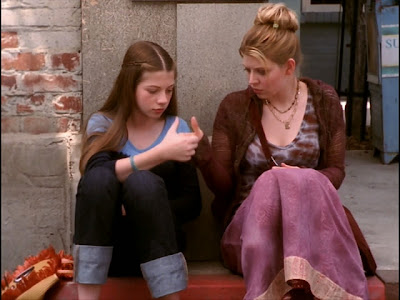 |
| Dawn and Tara, fellow outsiders from the Scooby gang, pass time with a thumb war. |
To quote my husband’s reaction as we reached season 5 during his (in-progress) Buffy indoctrination: “Why on earth are they doing this?”
Most of the Buffy fandom reacted with the same puzzlement. As Dawn’s character was fleshed out over the first few episodes of the season as the archetypical annoying little sister, the audience was still denied all but the vaguest of clues as to Dawn’s true nature and reason for being retconned into the Buffyverse.
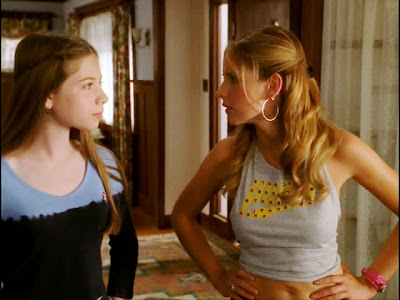 |
| Dawn as annoying little sister. |
It was not until the fifth episode of the season, “No Place Like Home,” that the Dawn’s existence is explained: she is a mystical key that opens gateways between dimensions, magically given human form with blood relation to the slayer, woven into her memories and all of those around her so that Buffy would protect her with her life, to keep the evil god Glory from using the Key to destroy the universe.
Unfortunately, the only place the monks’ spell couldn’t reach was the minds of the audience, and Dawn Summers had to win us over without the benefit of false memories. This may have been an impossible feat, given her character is pretty much laid out as an immature, whiny, brat with a tendency to get into trouble.
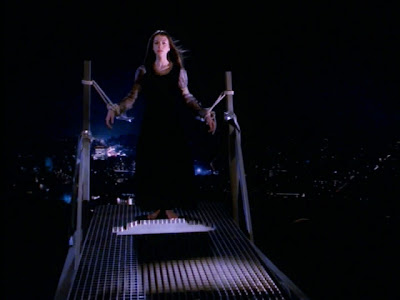 |
| Dawn in damsel-in-distress mode. |
Also, she occasionally does this thing where she piercingly shrieks “Get out, get out, GET OUT!” which ranks up there with nails on a chalkboard, dental drills, and Katy Perry songs when it comes to horrible sounds to endure.
And so it is that Dawn is one of the least-liked characters in the Buffyverse. But not by me. I love Dawn Summers.
I suspect my unusually high tolerance for Dawn comes from my OWN memories. In “Real Me,” the episode which properly introduces Dawn’s character, she writes in her diary/narrates: “No one understands. No one has an older sister who is the slayer.”
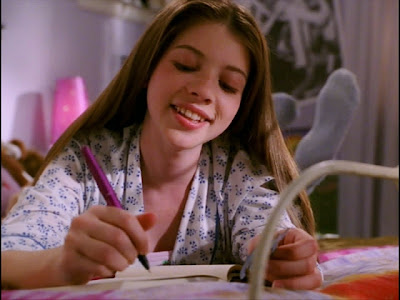 |
| Dawn writes in her diary. |
But I understand. OK, sure, my big sister didn’t have superpowers, and as far as I know she did not save the world even one time, much less “a lot.” But from my perspective as her bratty little sister, I felt like I could never escape her long and intimidating shadow. I could never be as smart as her, as special as her; I couldn’t hope to collect even a fraction the awards and accolades she racked up through high school. And she didn’t even properly counteract her super smarts with social awkwardness: she always had a tight group of friends and the romantic affections of cute boys. She was the pride and joy of my family, and I always felt like an also-ran. Trust me: this makes it very hard to not be at least a little bratty and whiny.
And my big sister was a lot nicer to me than Buffy usually was to Dawn. If the audience found out before Buffy did that Dawn was created to induce the slayer to protect the key, it might have been a little hard to swallow. Buffy shows only hostile resentment toward Dawn for the first half of Season 5. It is only after Dawn learns herself that she is new to the world that Buffy shows her true sisterly love, when she lovingly insists to Dawn that she is Buffy’s “real sister” despite her mystical origins.
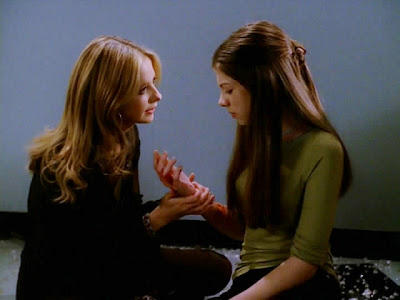 |
| “It doesn’t matter where you came from, or how you got here, you are my sister.” |
Because I relate to Dawn as a fellow annoying little brat following around her remarkable older sister, I am more forgiving of her character flaws. But I do think viewers without my background ought to take it easier on Dawn as well.
A common criticism of Dawn is that she’s much more immature than the main characters were at the start of the series, when they were close to her in age (Dawn is introduced as a 14-year-old in the eighth grade; Buffy, Xander, and Willow were high school sophomores around age 15 or 16 in Season 1). Writer David Fury responds to this in his DVD commentary on the episode “Real Me,” saying that Dawn was originally conceived as around age 12 and aged up a few years after Michelle Trachtenberg was cast, but it took a while for him and the other writers to get the originally conceived younger version of the character out of their brains. But I don’t need this excuse; I think it makes perfect narrative sense that Dawn comes across as more immature than our point-of-view characters were when they were younger. Who among us didn’t think of themselves as being just as smart and capable as grown-ups when we were teens? Who among us, when confronted with the next generation of teenagers ten years down the line, were not horrified by their blatant immaturity?
Additionally, Dawn starting her character arc as whiny brat lets us watch her grow and mature into a pretty awesome young woman. It is a long road, beset by personal tragedy and a theme of abandonment: Dawn loses her mother and her sister within a matter of months in Season 5, and in Season 6 sees her surrogate parent figures, Willow and Tara, split up just as a returned-from-the-grave Buffy is too detached from humanity to be there emotionally for Dawn. Throughout Season 6, Dawn acts out: lying to Buffy to stay out all night with friends, habitually and perhaps compulsively stealing, and ultimately sublimating her abandonment issues into a curse (with the help of Vengeance “Justice” Demon Halfrek), temporarily trapping the Scooby gang and some innocent bystanders in the Summers’ home.
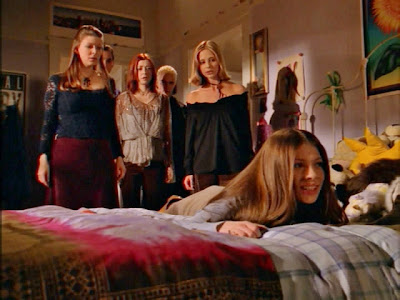 |
| Dawn’s tantrum in Season 6’s “Older and Faraway” |
But Season 6 represents an era of bad choices for almost the entire cast of Buffy the Vampire Slayer, so Dawn should be given as much slack for her missteps as we give the other wayward characters, including Buffy herself. And it is Dawn who finally pulls Buffy out of the emotional purgatory she is suffering in this season. In the Season 6 finale “Grave,” Buffy finally truly regains her will to live and recaptures her complete humanity, and this epiphany comes in large part because she finally sees Dawn as a gift in her life rather than a burden:
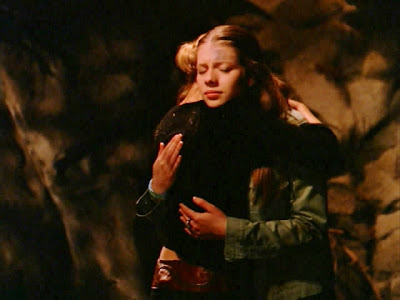 |
| Buffy and Dawn hug in “Grave” |
“Things have really sucked lately, but that’s all gonna change—and I want to be there when it does. I want to see my friends happy again. I want to see you grow up. The woman you’re gonna become… Because she’s gonna be beautiful. And she’s gonna be powerful. I got it so wrong. I don’t want to protect you from the world—I want to show it to you. There’s so much that I wanna to show you.” – Buffy to Dawn in “Grave.”
 |
| Dawn with Buffy during her metaphorical rebirth in “Grave.” |
Dawn finds her own self-actualization in the Season 7 episode “Potential,” having once again been shoved to the sidelines of Buffy’s attention by the arrival of a collection of young “potential slayers” who need protection from the Bringers, who have been systematically wiping out the future slayer lineage. While Buffy focuses on protecting and training the potentials, Dawn clearly feels left out, trapped by her own ordinariness and unimportance (a significant change for a girl who was once the key to the fabric between dimensions).
 |
| Dawn lurks in the background as Buffy gives a speech to potential slayers. |
That all changes when a spell cast by Willow appears to identify Dawn as a potential slayer herself. Dawn is emotionally overwhelmed by the news, mainly because she thinks it means that Buffy must die before Dawn could ever realize this potential (I’m pretty sure the next potential would be called only by the death of Faith, but that’s neither here nor there). A part of Dawn is clearly excited by the news, and given a huge jolt of self-confidence that lets her bravely defend herself against a vampire and then fight off the group of Bringers who come for her classmate Amanda, the true potential slayer identified by Willow’s spell. Dawn handles the news of her lack of slayer potential with perfect grace, saving Amanda’s life and transferring to her the confidence that comes with knowing you are “special.”
At the episode’s end, Xander, the only other remaining character without any superpowers, has a heart-to-heart with Dawn. He shares with her the wisdom he’s gained in seven years in these circumstances:
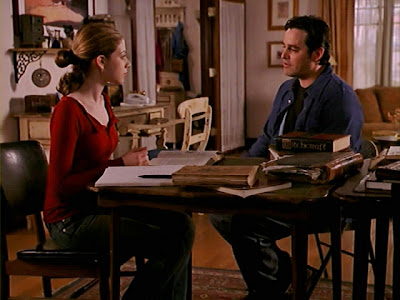 |
| Xander has a heart-to-heart with Dawn |
“They’ll never know how tough it is, Dawnie, to be the one who isn’t chosen. To live so near to the spotlight and never step in it. But I know. I see more than anybody realizes because nobody’s watching me. I saw you last night. I see you working here today. You’re not special. You’re extraordinary.” – Xander to Dawn in “Potential.”
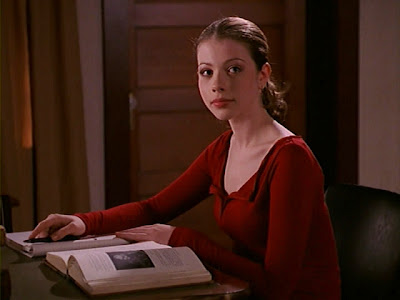 |
| Dawn accepts her humanity and finds her maturity. |
After “Potential,” Dawn, who began life at age 14, crafted from a ball of mystical energy and a spell creating powerful false memories, is finally defined by her humanity, her normalcy. She accepts this position with dignity, grace, and bravery. And in so doing, Dawn also steps up to her place as a mature young adult. And at least for this one-time bratty kid sister, that makes Dawn Summers is just as heroic and inspiring a character as Buffy herself.













Just found this article and what’s funny is I feel the same way about Dawn as you do. Well, in the very beginning I felt like every other viewer, I couldn’t stand her. Unlike you liking her right off the bat. But by the end of season 6 I was learning to understand her and realize it wasn’t out of place for her to act how she was given her home life and pretty much lack of really having a place in the group.
The bratty sister thing was overdone and for a while I hated Buffy being ‘all about saving Dawn.’ who was thrust upon us, but by the end of the show I had really liked and cared for her, mostly because she became useful and not just ‘Dawn’s in trouble? Must be Tuesday’ I’m very glad she was not one of the potentials, lol.